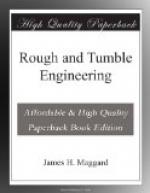Now, I am about to leave you alone with your engine, just as I have left any number of young engineers after spending a day with them in the field and on the road. And I never left one, that I had not already made up my mind fully, as to what kind of an engineer he would make.
Two ways of reading __________
Now there are two ways to read this book, and if I know just how you had read it I could tell you in a minute whether to take hold of an engine or leave it alone. If you have read it one way, you are most likely to say “it is no trick to run an engine.” If you have read it the other way you will say, “It is no trouble to learn how to run an engine.” Now this fellow will make an engineer, and will be a good one. He has read it carefully, noting the drift of my advice. Has discovered that the engineer is not expected to build an engine, or to improve it after it has been built. Has recognized the fact that the principle thing is to attend to his own business and let other people attend to theirs. That a monkey wrench is a tool to be left in the tool box till he knows he needs it. That muscle is a good thing to have but not necessary to the successful engineer. That an engineer with a bunch of waste in his hand is a better recommendation than an “engineer license.” That good common sense, and a cool head is the very best tools he can have. Has learned that carelessness will get him into trouble, and that to “forget” costs money.
Now the fellow who said “It is no trick to run an engine,” read this book another way. He did not see the little points. He was hunting for big theories, scientific theories, something he could not understand, and didn’t find them. He expected to find some bright scheme to prevent a boiler from exploding, didn’t notice the simple little statement, “keep water in it,” that was too commonplace to notice. He was looking for cuts, diagrams, geometrical figures, theories for constructing engines and boilers and all that sort of thing and didn’t find them. Hence “It is no trick to run an engine.”
If this has been your idea of “Rough and Tumble Engineering” forget all about your theory, and go back and read it over and remember the little suggestions and don’t expect this book to teach you how to build an engine. We didn’t start out to teach you anything of the kind. That is a business of itself. A good engineer gets better money than the man who builds them. Read it as if you wanted to know how to run an engine and not how to build one.
Study the following questions and answers carefully. Don’t learn them like you would a piece of poetry, but study them, see if they are practical; make yourself thoroughly acquainted with the rule for measuring the horse-power of an engine; make yourself so familiar with it that you could figure any engine without referring to the book. Don’t stop at this, learn to figure the heating surface in any boiler. It will enable you to satisfy yourself whether you are working your boiler or engine too hard or what it ought to be capable of doing.




